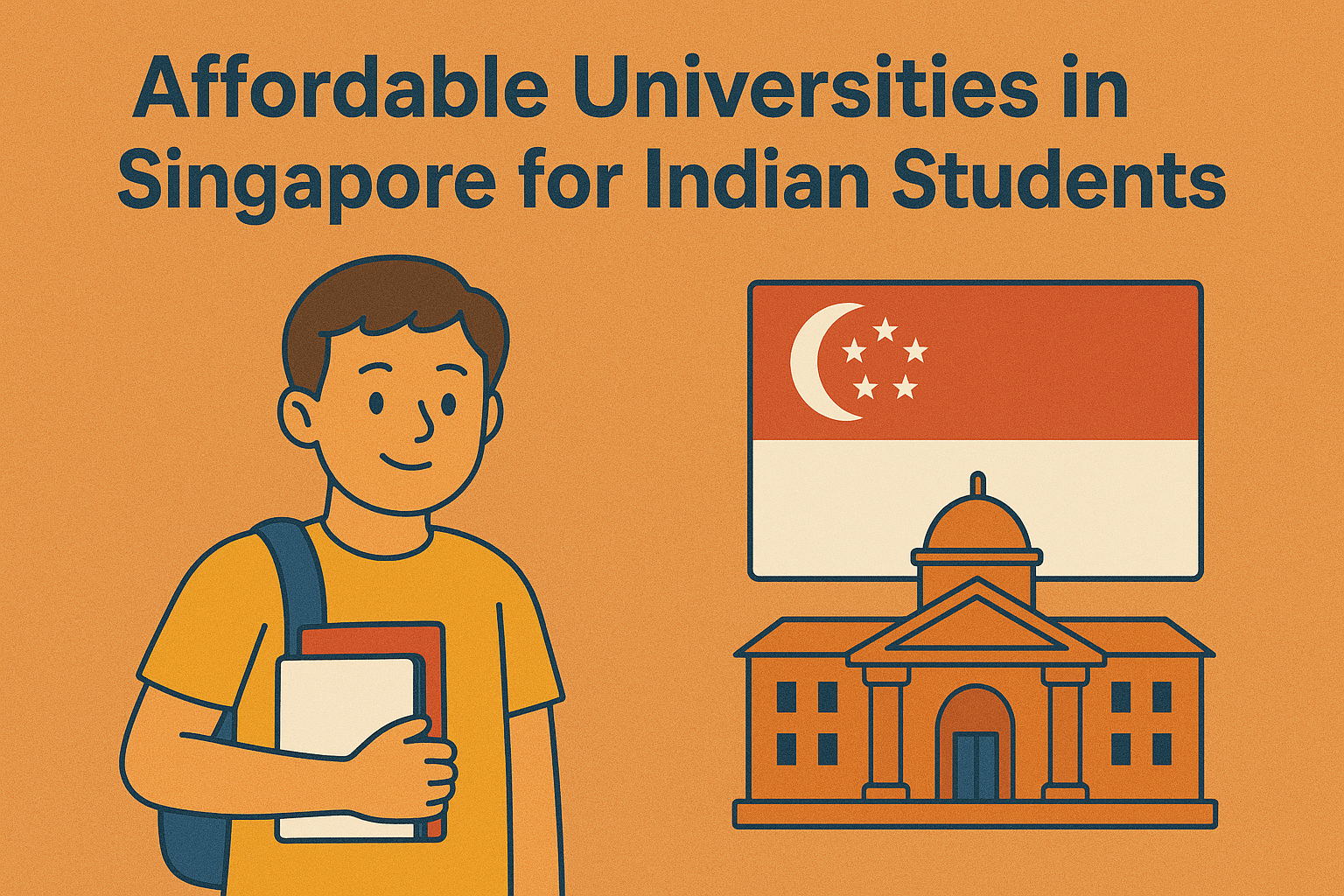Studying in Singapore offers high-quality education, a safe environment and career opportunities in a multicultural setting. Studying in Singapore in 2025 offers an affordable option for students who want to study abroad.
Study in Singapore
Singapore is an attractive study destination for Indian students due to its high-quality education, multicultural environment and career opportunities, the living expenses can be expensive in Singapore when compared to living expenses in India. Students can choose from a wide range of courses, particularly in STEM, Business and Law.
Education and Universities in Singapore
Singapore is a popular destination for Indian students due its world-class education, which uses English as the medium of instruction and a high quality of life. Applicants must have a good academic record and high grades (often above 90%) and possibly English proficiency tests like IELTS or TOEFL along with a letter of recommendation.
Students can pursue higher education programs, benefit from a simple student visa process, and have opportunities for internships and future career prospects in a global hub. While the cost of living and tuition is higher than in India, scholarships, education loans, and part-time work can help offset expenses.
Academic and Career Benefits
- English medium of instruction, eliminating the language barrier.
- High-quality education and well regarded universities.
- It provides a global perspective and exposure to modern, practical learning processes.
- Paid and unpaid internships to gain professional skills and experience.
- Transfer options to other countries like the UK, USA, Canada and more.
Singapore offers both public and private universities, with public options like the National University of Singapore and Nanyang Technological University having subsidized fees for international students. Singapore University Fees for Indian students vary significantly based on the programs and university, with undergraduate tuition ranging from approximately ₹15 to ₹24 lakhs per year and postgraduate (MS) tuition from roughly ₹25 to ₹45 lakhs.
| University | Estimated tuition fees |
|---|---|
| National University of Singapore (NUS) | Undergraduate tuition fees are estimated to be between ₹15 lakh and ₹19 lakh per year. |
| Temasek Polytechnic | ₹6.95 Lakhs+ (diploma courses) |
| London school of Business and Finance | INR 5 lakhs to INR 21 lakhs |
| James Cook University | First-year tuition fees can be around INR 9 Lakhs. |
| Nanyang Technological University (NTU) | Undergraduate tuition fees are estimated to be between ₹15 lakh and ₹18 lakh per year. |
| Amity Global Institute | ₹15 Lakhs |
| Singapore Management University (SMU) | Undergraduate fees range from approximately ₹36 lakh to ₹43 lakh per year. |
| Nanyang Polytechnic | ₹8 Lakhs |
Tuition and Scholarships in Singapore
Tuition fees in Singapore for Indian students vary significantly by university and program, but range from approximately INR 8.3 lakhs to INR 2.5 crores per year for undergraduate and postgraduate degrees.
Other Factors to Consider (Cost Breakdown)
- Cost of living: It can be around INR 18,000 to INR 2.5 lakhs per year on average, this includes accommodation, food and transportation.
- Hostel fees: Hostel fees can add an extra INR 3.22 lakhs to INR 6.76 lakhs or more per year, depending on the university.
- Tuition grants: Some universities offer tuition grants that can reduce the financial burden.
Indian students can find scholarships in Singapore for both undergraduate and postgraduate studies, including government funded options like the Singapore International Graduate Award (SINGA) for research and scholarships from universities such as NUS and NTU for PhD studies and the Singapore International Pre-Graduate Award (SIPGA) for pre-university education. Other opportunities include scholarships offered by specific companies or programs such as SIA Youth Scholarship or the Goh Keng Swee Scholarship. There are also other bursaries and scholarships that can cover up to 75% of tuition fees.
Admission Process
University Application
- Research and apply for the university.
- Gather documents like class 10 and 12 marks sheet, English proficiency tests scores, Standardized test scores like SAT/ACT for undergraduate or GRE/GMAT for postgraduate programs,Statement of Purpose (SOP) and Letters of Recommendation (LORs) and Passport-sized photos.
- Pay the application fees.
- Apply before the deadlines, which can vary but often falls between January and March for public universities.
After receiving an offer letter:
- Accept the offer
- Apply for student pass through immigration and Checkpoints Authority
- Submit required documents for the student pass
- Wait for approval
- Prepare for travel
Courses in Singapore
Students can find a wide range of courses in Singapore including popular fields like Business and Management, IT and Computer science, Engineering and Healthcare. Other options include Architecture, Law, Tourism and Hospitality, and various Arts and Design programs. Demand is particularly high for future-focused areas such as Data Science, Cybersecurity, and Artificial Intelligence, with postgraduate opportunities available in fields like MBA and Engineering .
Master's and Diploma in Singapore
Indian students can pursue Master's and Diploma programs in Singapore through a variety of public and private institutions. Popular Master's fields include Computer Science, Business, and Engineering, while diplomas are offered in areas like Management, Finance, and IT. Key requirements generally include a bachelor's degree, English proficiency (IELTS or TOEFL), and potentially GRE/GMAT scores.
FAQ'S
Q1. What are the best universities to study in Singapore?
Ans. The best universities in Singapore include the National University of Singapore (NUS) and Nanyang Technological University (NTU), Singapore Management University (SMU) and more based on your choice of program.
Q2. How is Singapore for Indian students UG?
Ans. Singapore is a strong option for Indian undergraduate students due to its high-quality education, globally recognized degrees, and excellent job prospects, particularly in tech and research fields.
Q3. Is GIIS Singapore a good college for 11th and 12th standard?
Ans. Yes, GIIS Singapore is considered a good college for 11th and 12th standard offering strong academics in both the IBDP and CBSE curricula.
Q4. What is the best study in Singapore?
Ans. The best study in Singapore depends on individual interest, but popular and in demand fields include Data Science, Cybersecurity, Artificial Intelligence, Software Engineering, Healthcare and Tourism Management.
Q5. What are some good courses and universities in Singapore?
Ans. Some of the best universities in Singapore include the National University of Singapore (NUS) and Nanyang Technological University (NTU), Singapore Management University (SMU). Popular courses include Computer Science, Engineering, Business, and Healthcare, with strong demand for specializations like AI, Data Science, and Biomedical Sciences.

